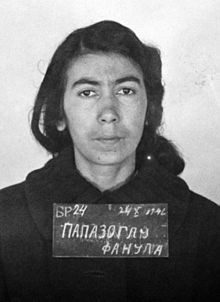Fanula Papazoglu
Fanula Papazoglu | |
|---|---|
 Fanula Papazoglu imprisoned at the Banjica concentration camp, 1942 | |
| Born | February 3, 1917 |
| Died | January 26, 2001 (aged 83) Belgrade, FR Yugoslavia |
| Nationality | Yugoslav, Serbian |
| Alma mater | University of Belgrade |
| Spouse | George Ostrogorsky |
| Scientific career | |
| Fields | Ancient history |
Fanula Papazoglu (Template:Lang-sr; Template:Lang-gr, 1917– January 26, 2001) was a Yugoslav and Serbian classical scholar, epigrapher and academic. She was an expert in Ancient history of the Balkans. She founded the Centre for Ancient Epigraphy and Numismatics in 1970.
Life
Papazoglu was born in Bitola, Kingdom of Serbia (modern North Macedonia), into a Greek family of Aromanian origin.[1][2][3][4] She finished secondary school (1936) in Bitola, before attending the University of Belgrade Faculty of Philosophy, where she studies classical philology, ancient history, and archeology. During the Axis occupation of Serbia she supported the Yugoslav Partisans as a member of the student organization, and spent a year in the Banjica concentration camp from 1942 to 1943.
She graduated from the Faculty of Philosophy in 1946, and worked at the Department for Ancient History at the Faculty of Philosophy from 1947. Her Ph.D. thesis in 1955 was Macedonian towns during the Roman period. She became a full professor in 1965.
On March 21, 1974 she was elected to the Serbian Academy of Sciences and Arts (SANU) as a corresponding member, and became a full member on December 15, 1983.
At the Belgrade University Papazoglu met and married the prominent Yugoslav Byzantologist of Russian origin, George Ostrogorsky, with whom she had a daughter - Tatyana, and a son - Alexander. Papazoglou retired in 1979. She died in Belgrade in 2001.
Work
- Makedonski gradovi u rimsko doba ("Macedonian towns during the Roman period"), 1955, thesis
- Prilozi istoriji Singidunuma i srednjeg Podunavlja Gornje Mezije, 1957
- Makedonski gradovi u rimsko doba, 1957
- Srednjobalkanska plemena u predrimsko doba ("The Central Balkan Tribes in Pre-Roman Times"), 1969, 1978
- Rimski građanski ratovi, 1991
- Istorija helenizma ("History of Hellenism"), 1995
Awards
- October Prize of the City of Belgrade
- July 7 Award (7. jul)
References
- ^ Robin J. Fox, Robin Lane Fox eds., Brill's Companion to Ancient Macedon: Studies in the Archaeology and History of Macedon, 650 BC - 300 AD, Edition illustrated, BRILL, 2011, ISBN 9004206507, p. 39.
- ^ Μιλτιάδη Χατζόπουλου, Φανούλα Παπάζογλου - Η μεγάλη ελληνίστρια και ιστορικός της αρχαίας Μακεδονίας.
- ^ Richard Clogg, Minorities in Greece: Aspects of a Plural Society. C. Hurst & Co. Publishers. 2002, ISBN 978-1-85065-705-7, p. 153.
- ^ Roudometof, Victor, "Nationalism and Identity Politics in the Balkans: Greece and the Macedonian Question". Journal of Modern Greek Studies. Baltimore: The Johns Hopkins University Press, (1996), p. 286, note # 29.
Sources
- SANU. "Фанула Папазоглу (Biography)" (Document) (in Serbian). SANU.
{{cite document}}: Unknown parameter|access-date=ignored (help); Unknown parameter|archive-date=ignored (help); Unknown parameter|archive-url=ignored (help); Unknown parameter|url-status=ignored (help); Unknown parameter|url=ignored (help) - OLGA PELCER-VUJAČIĆ. "FANULA PAPAZOGLU I RAZVOJ GRČKE EPIGRAFIKE" (Document).
{{cite document}}: Cite document requires|publisher=(help); Unknown parameter|url=ignored (help)
External links
- "Identity: Fanula Papazoglu". Worldcat.
